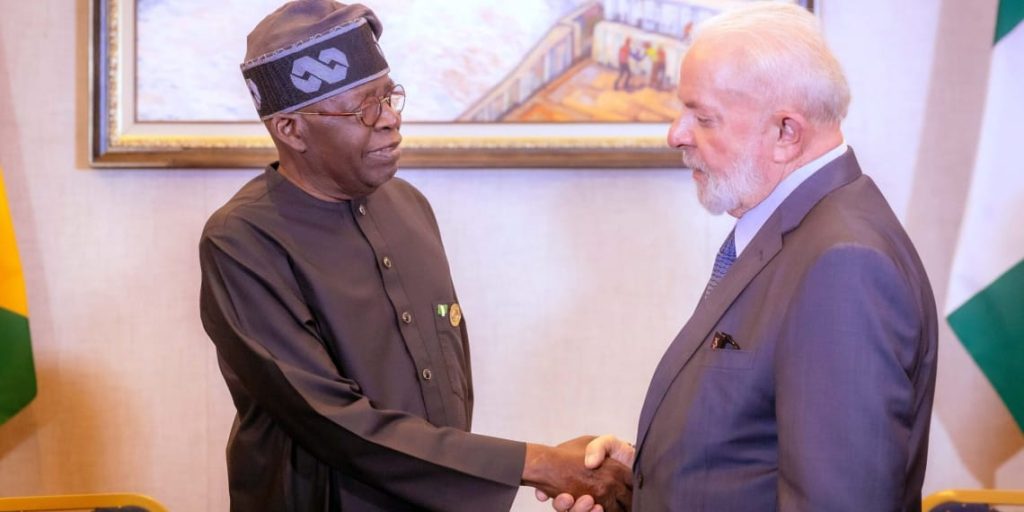
Daniel Otera
On 25 August 2025, President Bola Tinubu’s state visit to Brazil culminated in a historic recommitment to economic partnership, marked by the return of Petrobras, Brazil’s state-owned oil giant, to Nigeria’s energy sector after a five-year absence. The visit produced five Memoranda of Understanding (MoUs) covering trade, aviation, diplomacy, science, and agriculture signaling a bold push for South-South cooperation between two nations with the world’s largest Black populations.
With bilateral trade valued at $2.1 billion in 2024 (UN COMTRADE) and Nigeria’s 206 trillion cubic feet of gas reserves (OPEC) aligning with Brazil’s industrial expertise, the partnership has potential to reshape global trade flows. Yet its success will depend on overcoming structural barriers and ensuring equitable benefits as Tinubu pushes reforms under the Renewed Hope Agenda and Brazil navigates fiscal constraints.
Nigeria and Brazil share a 400-year history rooted in the transatlantic slave trade, which forcibly transported 4.8 million Africans many from Yoruba, Hausa, and Igbo communities to Brazil between 1500 and 1867 (Trans-Atlantic Slave Trade Database, Emory University).
This diaspora shaped Brazil’s cultural fabric. Yoruba deities anchor Candomblé, while Nigerian influences enrich Bahia’s cuisine. By 1888, returning Afro-Brazilians established Lagos’s “Brazilian Quarter,” home to over 3,200 residents (Brazilian Embassy archives). Today, roughly 9,000 Nigerians live in São Paulo, sustaining exchanges in music, Nollywood, and academia (Brazil Immigration, 2023).
Diplomatic ties, formalized in 1961, have since produced more than ten agreements, including the 2013 Nigeria-Brazil Strategic Dialogue Mechanism (SDM) the only one of its kind in West Africa. Yet trade has lagged behind potential. From a $9 billion peak a decade ago, volumes fell to $1.6 billion in 2023 before recovering to $2.1 billion in 2024. Brazil exports machinery, sugar, and poultry worth $977.5 million, while importing $880.4 million in Nigerian fertilisers and fuels (UN COMTRADE). Non-oil exports, led by cocoa and sesame, reached $0.62 billion in late 2024, highlighting untapped opportunity.
Tinubu’s third Brazil visit, following the 2024 G20 and 2025 BRICS summits, yielded transformative deals signed at the Palácio do Planalto alongside President Luiz Inácio Lula da Silva.
- Aviation: Nigeria’s Festus Keyamo and Brazil’s Silvio Costa Filho signed a Bilateral Air Services Agreement authorizing direct Lagos–São Paulo flights by Air Peace. Lula described this as “an essential step to strengthen ties.” Direct routes could cut travel costs inflated by European layovers and boost tourism by 25%, generating $60 billion by 2030 (AU projections).
- Diplomacy: Pacts for diplomatic training and political consultations were signed by Nigeria’s Bianca Ojukwu and Brazil’s Mauro Vieira. Building on the SDM, they will enhance cooperation on climate and security.
- Science & Technology: Ministers Geoffrey Nnaji and Luciana Santos agreed to collaborate in biotechnology, bioeconomy, ocean science, energy, and digital transformation. Brazil’s strong renewable energy mix (45%, IRENA) could support Nigeria’s target of 30% renewables by 2030.
- Agriculture: The Bank of Agriculture and Brazil’s BNDES signed an MoU to deepen investment, building on the $1.1 billion Green Imperative (10,000 tractors, 100,000 jobs). This partnership could help reduce Nigeria’s 25% post-harvest losses (FAO) by leveraging Brazil’s $150 billion agricultural export model.
- Energy (Petrobras): Tinubu welcomed Petrobras’ return, urging it to partner on Nigeria’s vast gas deposits. With $125 billion in revenue in 2023 (Fortune Global 500), Petrobras exited Nigeria in 2020 amid the Lava Jato scandal but is now targeting deepwater fields like Agbami (250,000 bpd). Nigeria’s 30% share of Africa’s gas reserves could see a 20% production boost, adding $450 billion to GDP via AfCFTA (AfDB).
Tinubu also highlighted Embraer’s plans for a Nigerian service center to ease maintenance delays grounding 40% of aircraft (NCAA) and pushed for Brazilian investments in pharmaceuticals and manufacturing: “I don’t know why the manufacturing of generic drugs, which Brazil has done deeply and far, cannot be in Nigeria.”
This partnership could challenge Western-dominated trade structures by anchoring South-South cooperation. Nigeria’s reforms, subsidy removal, currency unification spurred 3.4% GDP growth in 2024, projected at 3.7% in 2025 (World Bank). Its Q1 2025 trade surplus stood at N5.17 trillion (NBS). Brazil’s $74.6 billion trade surplus in 2024, though down 25% (Reuters), reflects industrial strength.
Together, the two economies could redirect trade flows: Nigeria’s raw materials fueling Brazilian industry, and Brazilian technology modernizing Nigeria’s economy. Lula emphasized: “At a time when protectionism and unilateralism have returned, Nigeria and Brazil reaffirm their bet on free trade and productive integration.”
This aligns with AfCFTA’s projected 52% boost to intra-African trade by 2035 (AfDB) and BRICS’ drive for alternative trade systems, with Nigeria now a 2025 partner nation.
Despite optimism, significant risks remain:
Debt & Inflation: Nigeria faces $1.1 trillion debt and 23% inflation (NBS 2024), with 63% living in multidimensional poverty (UNDP). Brazil battles fiscal deficits and rising imports.
Governance: Petrobras left Nigeria in 2020 amid corruption scandals. Nigeria’s corruption perception score is 25/100 (Transparency International 2024).
Implementation Gaps: Only 15% of AU resolutions are implemented (AU 2023). Past MoUs risk stalling without political will.
Social Risks: Brazil’s 9,000 Nigerians may face xenophobia, as seen in South Africa where 48% view foreigners as job threats (Afrobarometer).
A phased strategy, leveraging AfCFTA and ECOWAS (20% trade growth since 2015, UNECA), could mitigate risks. Nigeria–South Africa’s $2.5 billion trade in 2024 offers a model for Brazil. Tinubu’s reforms, already saving $1.3 billion in foreign exchange (CBN 2024), suggest readiness.
The Nigeria-Brazil pact, anchored by Petrobras’ return and five MoUs, could redefine trade dynamics by combining Nigeria’s resource wealth with Brazil’s industrial technology. With bilateral trade projected to rise from $2.1 billion to $3.5 billion by 2030 (Nigeria’s Trade Ministry), the alliance may challenge Western dominance while deepening BRICS and AfCFTA frameworks.
Still, debt, governance, and inequality remain barriers. As Tinubu declared: “We assured each other that only we can develop our economies to help our sovereignty.”
If executed with discipline, this partnership could position Nigeria and Brazil as vanguards of a new economic order one rooted in shared heritage, mutual ambition, and South-South solidarity.
